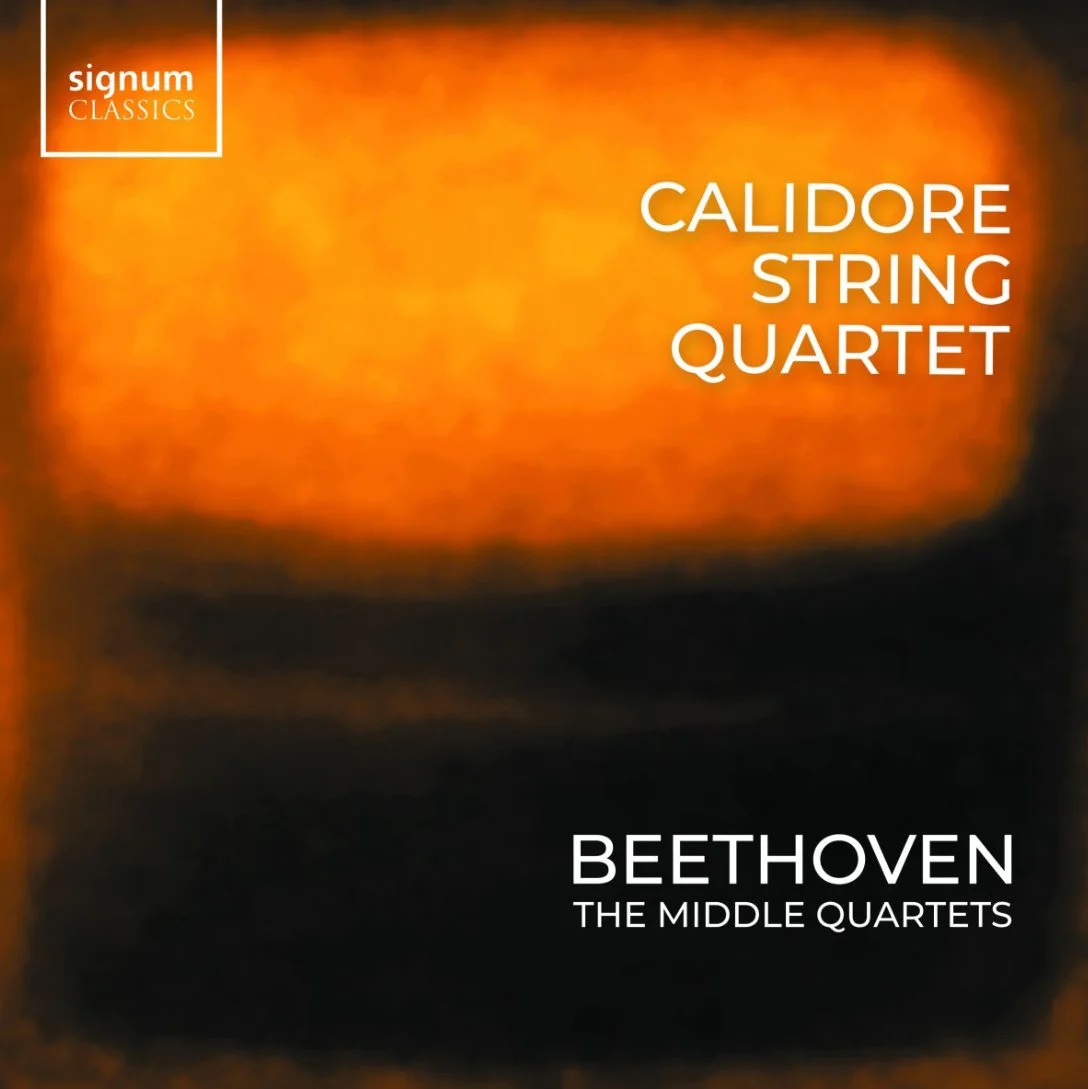Beethoven Quartets, Vol. 2: Middle String Quartets—Calidore String Quartet/Signum Classics 3 CD set
Release date is September 13, 2024.
Catalogue number: SIGCD872
Barcode: 635212087220
Beethoven came to the string quartet format quite late. Much like the first of his symphonies, piano concertos and piano sonatas, the first quartets were sketched when he was 25. He was well aware of the qualities his acquaintance Mozart and his teacher Joseph Haydn brought to the string quartet form. He wanted his first works to be in their exalted company.
As such, his first quartet was published in 1801. At first, he was timid about its qualities telling his friend Carl Amenda (the original dedicatee) "Be sure not to hand on to anybody your quartet, in which I have made some drastic alterations. For only now have I learnt to write quartets; and this you will notice, I fancy, when you receive them." The quartet underwent many revisions. I think history has proved the opposite of Beethoven’s fears. The first set of six quartets, Op. 18 became staples in the repertory soon after publication.
This new Signum Classics recording is of the “Middle Quartets” (1806 - 1810) and is contained on 3 CDs. CD 1 includes the String Quartet No. 7 in F major, Op. 59, No. 1, CD 2 the String Quartet No. 8 in E minor, Op. 59, No. 2 and String Quartet No. 9 in C major, Op. 59, No. 3 and on CD 3 the String Quartet No. 10 in E-flat major, Op. 74 and String Quartet No. 11 in F minor, Op. 95..
The repertoire includes Beethoven’s three "Rasumovsky" Quartets, the “Harp” Quartet and the “Serioso” Quartet.
This is the second installment of the New York City-based Calidore String Quartet’s Beethoven project. The first was Beethoven’s Late Quartets released in 2023 (photo below) and, I assume, the Early Quartets will be up next.
I discovered the Calidore String Quartet by very pleasant happenstance. We were discussing Beethoven quartets during the “Building a Library” section on our Everything Classical Music Livestream (available @AudiophiliaChannel) and one of our live viewers suggested the 2023 “Late Quartet” installment set from the Calidore as a start. As I always do, any suggestions from our live audience or later in the comments on the recorded show, I check out. I streamed the Late Quartets and was mightily impressed. I talked about the set at length on the following show as a top recommendation from the many young quartets now before the public.
Later, I discovered the viewer in question is the father of the quartet’s first violin. He is justly proud of his son and I’m so glad he made the introduction on the show. He very kindly sent this latest “Middle Quartets” set purely for enjoyment with no expectation of a full review in Audiophilia. I’m more than happy to—I believe many of our readers will hear the same level of expertise and superb musicianship as your reviewer.
The Calidore String Quartet. From L to R Estelle Choi, cello, Jeffrey Myers, violin, Ryan Meehan, violin, Jeremy Berry, viola. Photo credit: Jeffrey Fasano.
The Calidore has won many prizes, including the 2016 $100,000 “M Prize” from the University of Michigan’s School of Music, Theater & Dance and is resident at The University of Delaware. They were founded at the Colburn School in Los Angeles in 2010.
Performance
From many hours of listening to the first instalment of their Beethoven cycle, I’m hearing a quartet that blends each unique artist’s sound beautifully. There is no “star”, the ensemble is the attraction here. They continue the very high standards set in 2023 on this 2024 set.
Thus, they match vibrato for much of the time then switch off the vibrato for a complete change of mood. It’s very effective playing. And they approach each phrase with loving affection—not precious or overdone. Their approach works extremely well.
For me, the proof with string quartet ensembles is always about the intonation. I’m happy to report. Very fine. Few if any gentle slips.
From the opening of the famous first Rasumovsky quartet (Op. 59), first, you’ll smile in recognition (see photo below), then you’ll enjoy the crackerjack ensemble but with musical phrasing that does not allow for harsh edges. Also, dynamics are strictly adhered to.
The performance level, musical direction and style are consistent through all three discs, following nicely from the Late Quartets. I’m sure they’ll bring the same concentration and excellence to the third instalment.
Sound
The sound is as consistent as the performances—detailed and dynamic but capturing the warmth the quartet brings to the great music.
The set was recorded at Gore Recital Hall, University of Delaware. It’s a lively, resonant space captured almost perfectly by the Signum engineers.
Conclusion
A first choice? Well, these talented young guns are up against the greatest artists that ever played as a quartet, including Alban Berg, Emerson, Budapest, Cleveland, Vermeer, and many others. Let’s say they hold their own, in the very best modern sound and bring a very fresh approach to their interpretations re vibrato, non-vibrato, bowing, etc.
As far as young American quartets, they certainly match my favourite Dover Quartet Beethoven cycle on Cedille. Highly recommended.






